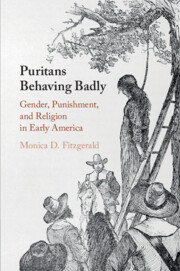Book contents
- Puritans Behaving Badly
- Puritans Behaving Badly
- Copyright page
- Dedication
- Contents
- Figures
- Tables
- Acknowledgments
- Introduction
- 1 The Great Hen Squabble and Regulating the Godly Path
- 2 Drunkards and Fornicators on Meeting House Hill
- 3 “Wicked Tongues and Wayward Behavior”
- 4 A “Blubbering” War Hero and the Middle Ground of Masculinity
- 5 “Unquiet Frame of Spirit”
- Conclusion
- Bibliography
- Index
4 - A “Blubbering” War Hero and the Middle Ground of Masculinity
The Case of Captain John Underhill
Published online by Cambridge University Press: 02 May 2020
- Puritans Behaving Badly
- Puritans Behaving Badly
- Copyright page
- Dedication
- Contents
- Figures
- Tables
- Acknowledgments
- Introduction
- 1 The Great Hen Squabble and Regulating the Godly Path
- 2 Drunkards and Fornicators on Meeting House Hill
- 3 “Wicked Tongues and Wayward Behavior”
- 4 A “Blubbering” War Hero and the Middle Ground of Masculinity
- 5 “Unquiet Frame of Spirit”
- Conclusion
- Bibliography
- Index
Summary
Chapter 4 focuses on the challenges Puritanism posed to masculinity by examining the case of war hero Captain John Underhill. Famous for his triumphant massacre of the Pequot Indians, Underhill was the definition of military manhood, or hypermasculinity. Trained by his father to be a soldier, Underhill embraced a masculinity of power, sexual prowess, pride, and heroism that was not a good fit in Puritan New England. The new Puritan man needed to moderate some of the excesses of traditional masculine norms. Shortly after his wartime heroism, Underhill found himself excommunicated and banished from Massachusetts Bay, and he clumsily navigated this gender terrain, ultimately gaining readmission to the church and colony by offering a thoroughly over-the-top, feminized, weeping confession. While Underhill fought for the status and power he thought he deserved, other men faced similar problems of competing masculinities. Some conformed, and others realized that they could not survive the New England way. Laymen in charge of church discipline created a middle ground of masculinity that blended versions, providing men a language and a sense of public duty that preserved their manhood.
Keywords
- Type
- Chapter
- Information
- Puritans Behaving BadlyGender, Punishment, and Religion in Early America, pp. 95 - 116Publisher: Cambridge University PressPrint publication year: 2020

